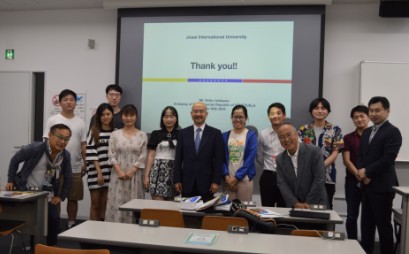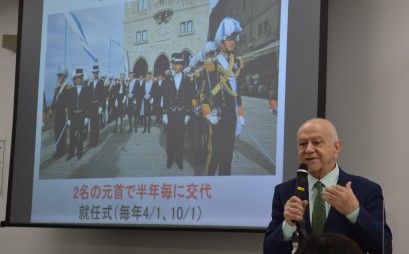
駐日大使が来学し特別講義 日本との接点や自国の魅力、課題を丁寧に解説
大学院
2022.07.31

学生や教員と記念撮影するベネズエラのセイコウ・イシカワ大使(中央)/Venezuelan Ambassador Seikou Ishikawa (center) poses for a commemorative photo with students and faculty.

画像とともにサンマリノの政治体制を紹介するマンリオ・カデロ大使/Ambassador Manlio Cadero introducing the political system of San Marino with images.
国際アドミニストレーション研究科の特別講義「国際理解・展望」で、各国の駐日大使をゲストスピーカーに招いての授業を昨年度から展開しています。今年度はバングラデシュ、ベネズエラ、サンマリノの各大使が東京紀尾井町キャンパスを訪れ、それぞれの国の政治、経済、文化の特徴や抱えている課題などを学生に直接話してくださいました。
6月30日に講義を行ったベネズエラのセイコウ・イシカワ大使は日系二世で、「作家の開高健がベネズエラを訪れた時、私の父がガイドをしました」と、ファミリーと日本との深い関わりから話を始めました。続いて、カカオ豆が名産で最大の輸出国が日本であること、「ラミちゃん」の愛称で日本でも親しまれたアレックス・ラミレス元選手に代表されるように、野球が盛んであることなど、ベネズエラと日本との接点に言及し、学生たちの好奇心を引き出しました。
イシカワ大使はまた、979メートルもの落差で有名な滝「エンジェルフォール」をはじめとする美しく豊かな自然の画像を紹介する一方で、インフレや政情不安など、ベネズエラが内包する課題にも言及し、地域全体で問題解決に取り組む参加型民主主義が成果を上げつつあることに触れました。
最後に、「私自身がとても誇りに思っていること」として、「エル・システマ」と呼ばれるベネズエラの音楽教育プログラムを紹介しました。貧困層の子どもが無償で音楽を学べる教育プログラム。世界70以上の国や地域で展開され、子どもたちの協調性や社会性を育んだり、第一線で活躍する音楽家を輩出したりするなど、その効果が注目を集めています。日本でも、東日本大震災で被災した子どもや障がいのある子どもたちを対象にプログラムが実施されており、イシカワ大使も普及に尽力されています。「かつてクラシック音楽は、選ばれた人たちだけが演奏し、楽しむものでした。誰もが平等に音楽教育を受けることができるエル・システマはまさに、インクルージョン。互いを尊重し、ともに生きる力を育むこのプログラムが、ベネズエラから世界各地に広がっています」と、イシカワ大使は学生たちに笑顔で語りかけました。
7月14日に来学くださったサンマリノのマンリオ・カデロ大使は東京に長年在住し、ジャーナリストとして20年以上取材活動をされるなど、各国の駐日大使きっての日本通として知られています。この日の講義も日本語で行い、両国の歴史をユーモアもまじえて解説してくださいました。
学生たちの興味を引いたのは、サンマリノの政治体制です。60人いる政治家は全員が副業を持っていて、いつでも辞任可能です。また、大統領は2名が半年ごとに交替で務めます。「一国民として自分も仕事をしているので、一般国民の気持ちがとてもよく理解できます。大統領も半年では悪いことをする時間がなく、クリーンな政治が実現できます」と、カデロ大使はこの制度のメリットを説明。さらに、犯罪歴がない限り、希望して面接に通れば大統領になれると聞き、学生たちは一様に驚いた表情になりました。
国土が5番目に狭い小国ながら、現存する最古の共和国であるサンマリノは、これまで一度も戦争をしたことがなく、軍隊も保有していません。「戦争の原因は欲です。国土を広げれば広げるほど欲張りになり、犯罪も増える。小さいことは決してデメリットではないのです」とカデロ大使は示唆に富んだコメントをしてくださいました。
日本に対しては、「戦争で多大なダメージを受けながら教育に力を入れ、人材を育てることで成長を果たしました。大学、博物館、植物園などの数が人口比世界トップレベルで、多数のノーベル賞受賞者を輩出しています」と称え、「これからも義理と人情を大切にする国であってほしい」と述べました。
The Ambassadors to Japan Visit JIU to Deliver Special Lectures: Points of Contact with Japan, Attractiveness of His Country, and Issues to be Addressed
Since last year, the Graduate School of International Administration has been inviting ambassadors of various countries to Japan as guest speakers in its "International Understanding and Perspectives" special lecture series. This year, the ambassadors of Bangladesh, Venezuela, and San Marino visited the Tokyo Kioicho Campus and spoke directly to students about the political, economic, and cultural characteristics of their respective countries and the challenges they are facing.
Venezuelan Ambassador Seikou Ishikawa, who gave a lecture on June 30, is a second-generation Japanese American and began his talk with the deep relationship between his family and Japan, saying, "When the writer Ken Kaiko visited Venezuela, my father was his guide. He then mentioned the points of contact between Venezuela and Japan, such as the fact that Venezuela is famous for its cacao beans, of which Japan is the largest exporter, and that baseball, as represented by former player Alex Ramirez, nicknamed "Rami," is very popular in Japan, and drew the curiosity of the students.
Ambassador Ishikawa also introduced beautiful and abundant images of nature, including "Angel Falls," a waterfall famous for its 979-meter drop, and mentioned the challenges Venezuela faces, such as inflation and political instability, and mentioned that participatory democracy, in which the entire region works together to solve problems, is bearing fruit. He also mentioned that participatory democracy, in which the entire region works together to solve problems, is bearing fruit.
Finally, as "something I am very proud of myself," he introduced a music education program in Venezuela called "El Sistema. This educational program allows poor children to learn music for free. The program has been developed in more than 70 countries and regions around the world and has attracted attention for its effectiveness in nurturing children's cooperative and social skills and producing musicians who are active at the forefront of their field. In Japan, a program has been implemented for children affected by the Great East Japan Earthquake and for children with disabilities, and Ambassador Ishikawa is also making efforts to promote the program. In the past, classical music was performed and enjoyed only by a select group of people. El Sistema, where everyone has equal access to musical education, is truly about inclusion. This program, which fosters mutual respect and the ability to live together, is spreading from Venezuela to all over the world," Ambassador Ishikawa told the students with a smile.
Ambassador Manrio Cadero of San Marino, who visited our campus on July 14, has lived in Tokyo for many years and is known as one of the best Japan experts among ambassadors to Japan, having worked as a journalist for over 20 years. He gave his lecture in Japanese, explaining the history of the two countries with a touch of humor.
The students were interested in the political system in San Marino, where all 60 politicians have a second job and can resign at any time. The presidency rotates between two presidents every six months. As a citizen myself, I do the job, so I understand very well how the general public feels. The president also has no time to do anything wrong in six months, and clean politics can be achieved," said Ambassador Cadero, explaining the benefits of this system. Furthermore, the students were all surprised to hear that, as long as they have no criminal record, they can become president if they wish and pass the interview.
San Marino, the fifth smallest country and the oldest existing republic, has never fought a war and has no army. The cause of war is greed. The more you expand your land, the greedier you become and the more crime you commit. Being small is never a disadvantage," Ambassador Cadero commented thoughtfully.
Regarding Japan, he said, "Despite the tremendous damage caused by the war, we have achieved growth by focusing on education and nurturing human resources. Japan has the world's highest number of universities, museums, and botanical gardens relative to its population, and has produced numerous Nobel laureates," he praised, adding, "I hope that Japan will continue to be a country that values loyalty and humanity.